The 2nd FV – CVT Cardiovascular Therapeutics Symposium: The Present & Future of Cardiovascular Therapeutics was organised by FV in Ho Chi Minh City on 20th Apri 2024, The symposium provided a wealth of medical knowledge by gathering leading domestic and international experts to share the latest advancements in the diagnosis and treatment of cardiovascular diseases.
The conference, meticulously organised by FV, provided valuable information for the medical community, offering opportunities for knowledge and practical experience exchange for new treatment methods for cardiovascular patients.
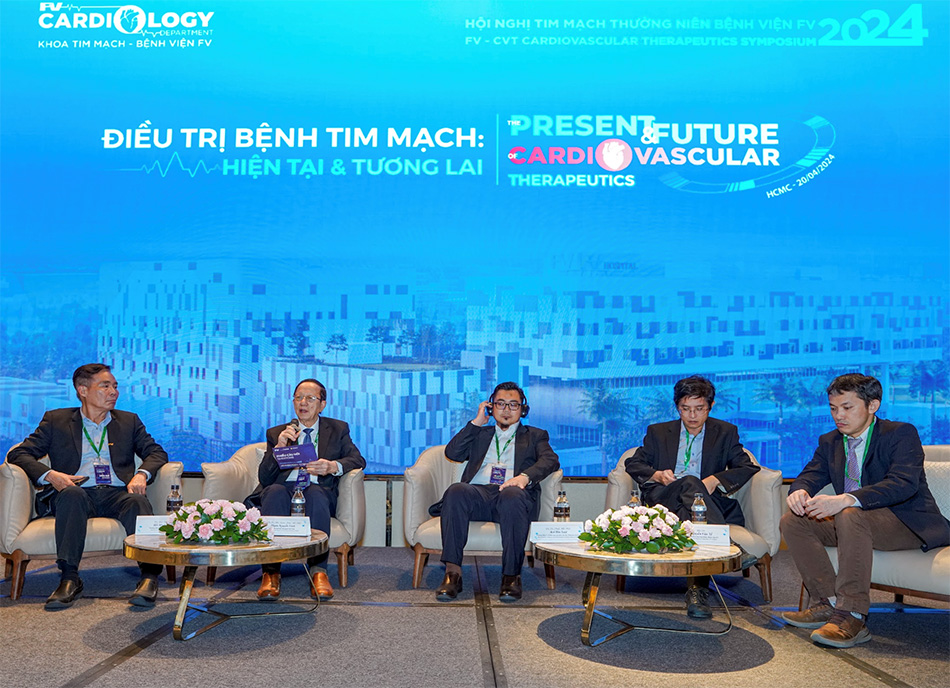
Domestic and international experts shared solutions for treating cardiovascular diseases.
Cardiovascular disease is a leading cause of death worldwide. In Vietnam, according to statistics from the Ministry of Health, approximately 200,000 patients die from cardiovascular diseases each year (accounting for up to 33% of all deaths). Due to the severity of these rates, numerous studies worldwide focus on improving diagnostic and treatment methods. As a result, there are continuous advancements in the field announced every year.
As one of the major cardiovascular centres in Vietnam, FV Hospital has devoted considerable effort and resources to organising annual cardiovascular conferences to connect the medical community both domestically and internationally. “The cardiovascular conference organised by FV is an opportunity for domestic and international experts to share experiences, exchange knowledge, and gain insight on the latest techniques in the diagnosis and treatment of cardiovascular diseases, to provide more opportunities for patients in Vietnam to receive treatment using new techniques,” said Ho Minh Tuan, MD, PhD, Head of the Cardiology Department at FV Hospital.
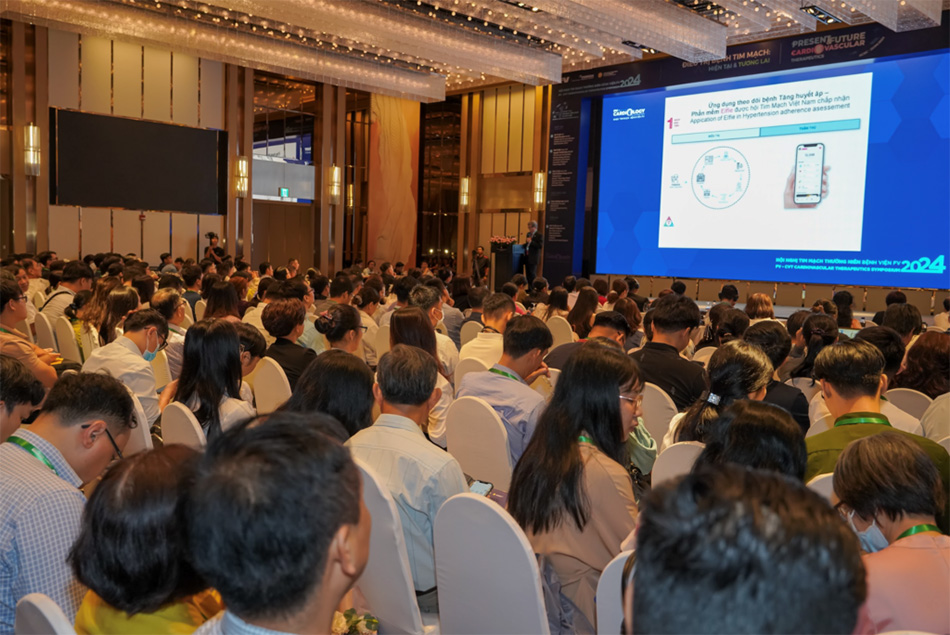
The 2024 FV – CVT Cardiovascular Therapeutics Symposium organised by FV Hospital attracted many reputable speakers from both domestic and international backgrounds to participate.
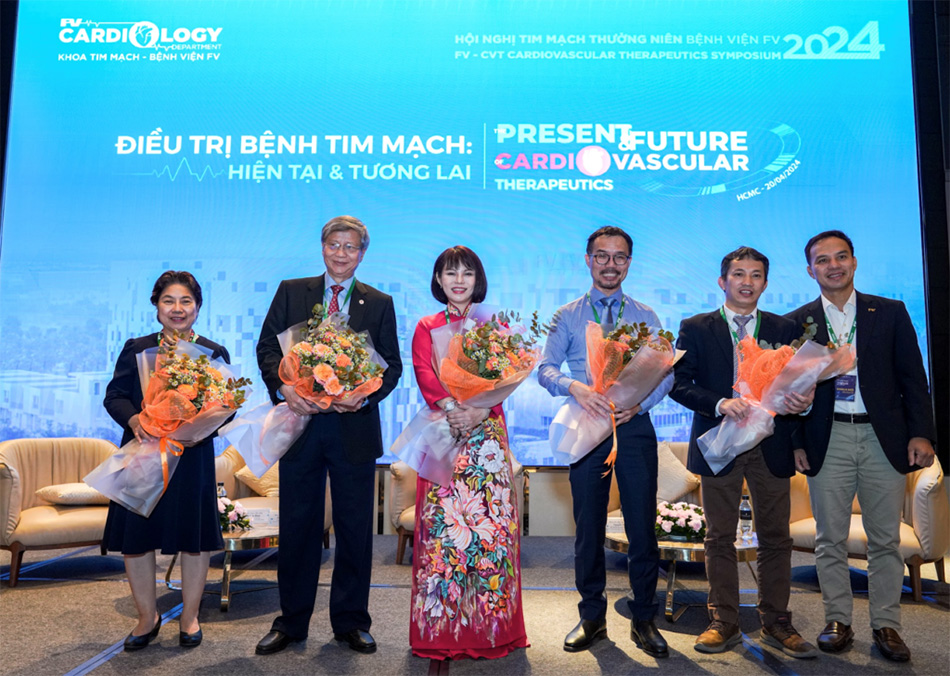
This year’s symposium attracted approximately 300 participants, including cardiologists, internists, and resident physicians from Ho Chi Minh City and other provinces. Participants received Continuous Medical Education (CME) certificates issued by FV Hospital after the conference.
The symposium was highly praised by the professional community for bringing together a team of prestigious domestic and international speakers, including professors and cardiologists: Prof. Huynh Van Minh, MD, PhD – President of the Vietnam Heart Association (VNHA); Assoc. Prof. Nguyen Thi Bich Dao, MD, PhD – Vice President of the Vietnam Association of Diabetes & Endocrinology (VADE); Assoc. Prof. Tran Thi Khanh Tuong, MD, PhD – Head of the Faculty of Medicine, Pham Ngoc Thach University of Medicine; Prof. Asri Bin Said, MD, PhD – Dean of Faculty of Medicine and Health Sciences, University Malaysia Sarawak; Assoc. Prof. Dr Edward T. C. Choke – Senior Consultant Cardiologist, Sengkang General Hospital Singapore; Assoc. Prof. Pham Nguyen Vinh – Vice President of the Vietnam Heart Association (VNHA); Ho Minh Tuan, MD, PhD – Head of Cardiology Department, FV Hospital; Dr Nguyen Van Te – Head of Nuclear Medicine, FV Hospital; Do Nguyen Tin, MD, PhD – Head of Cardio Intervention Centre, Children’s Hospital 1.
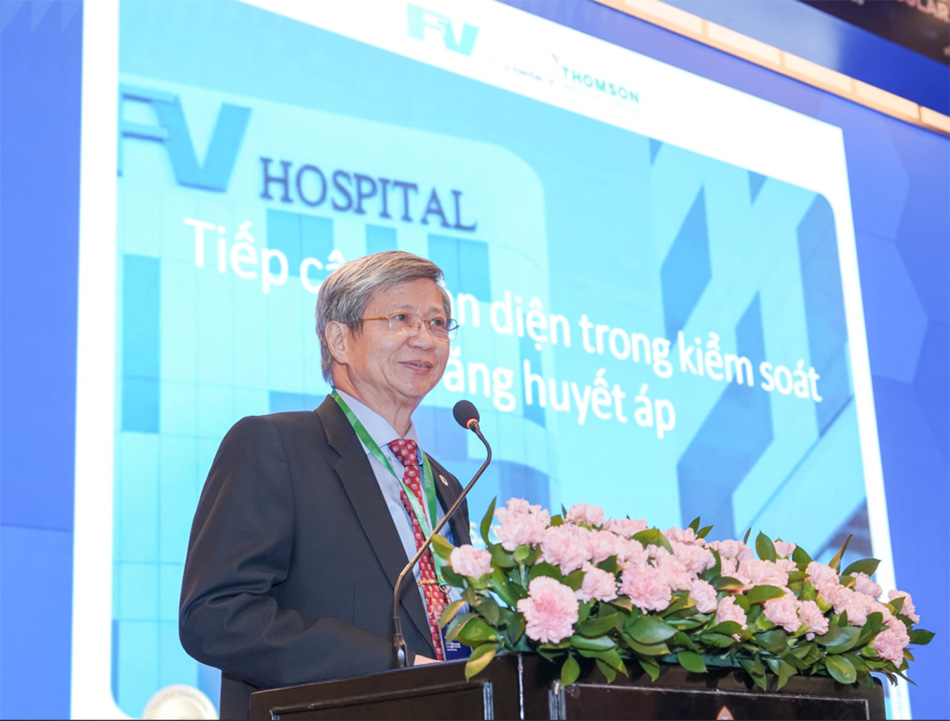
Prof. Huynh Van Minh, MD, PhD – President of the Vietnam Heart Association (VNHA)
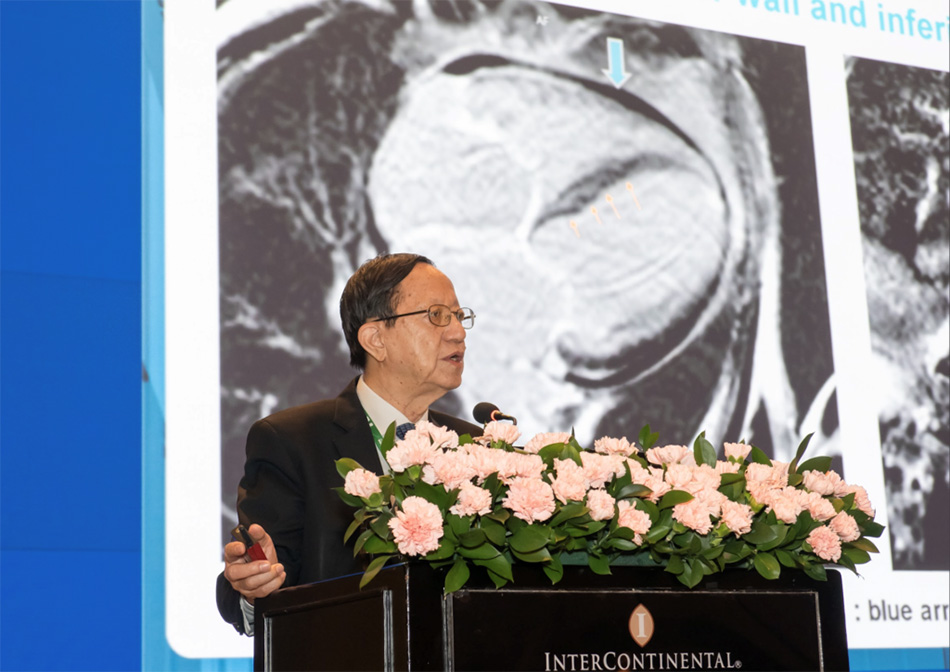
Assoc. Prof. Pham Nguyen Vinh – Vice President of the Vietnam Heart Association (VNHA)
Professor Huynh Van Minh, MD, PhD – President of the Vietnam Heart Association (VNHA) stated: “The highlight of this symposium is that we have invited many international experts from Singapore and Malaysia. These experts have introduced new and promising techniques. Some techniques have not yet been introduced into Vietnam, but we believe that with the agility of Vietnam’s healthcare system, and our ambitious and competent young doctors we will soon access these techniques, such as endovascular laser techniques for peripheral vascular interventions, which may be preferred over surgery in some cases.”
Assoc. Prof. Dr Edward T. C. Choke – Senior Consultant Cardiologist, Sengkang General Hospital Singapore, expressed his delight and enthusiasm to participate in this conference by FV. “From what I know, peripheral vascular intervention techniques are rapidly developing in Ho Chi Minh City. I am attending the conference not only to update my knowledge from colleagues but also to observe Vietnamese doctors teaching their interns for specific issues, so that I can learn and then teach our interns in Singapore.”
The opportunity to apply many new achievements in treating heart disease
This year, scientific reports at the conference focused on two main sections: General cardiovascular disease and PCI; Cardiomyopathy and structural heart disease.
In the section on general cardiovascular disease and PCI, speakers brought many new insights in the diagnosis, management, and treatment of heart disease such as: Comprehensive approach for hypertension control (Presented by Prof. Huynh Van Minh, MD, PhD – President of the Vietnam Heart Association (VNHA); Management of cardiovascular disease in patients with diabetes: when and how? The endocrinologist’s viewpoint on it (presented by Assoc. Prof. Nguyen Thi Bich Dao, MD, PhD – Vice President of the Vietnam Association of Diabetes & Endocrinology (VADE)); Prevention and treatment of GI bleeding related to antithrombotic drugs (Presented by Assoc. Prof. Tran Thi Khanh Tuong, MD, PhD – Head of the Faculty of Medicine, Pham Ngoc Thach University of Medicine); When to use OCT or IVUS during PCI (Presented by Ho Minh Tuan, MD, PhD – Head of Cardiology Department, FV Hospital); Atherectomy options for CTLI (Presented by Assoc. Prof. Dr Edward T. C. Choke – Senior Consultant Cardiologist, Sengkang General Hospital Singapore).
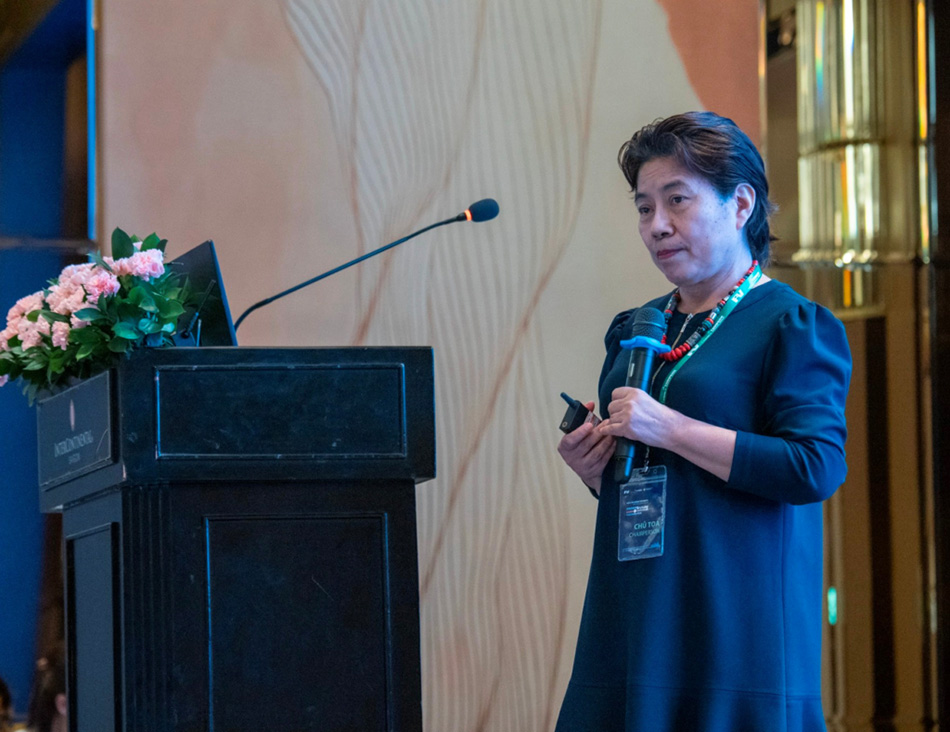
Assoc. Prof. Nguyen Thi Bich Dao, MD, PhD – Vice President of the Vietnam Association of Diabetes & Endocrinology (VADE)
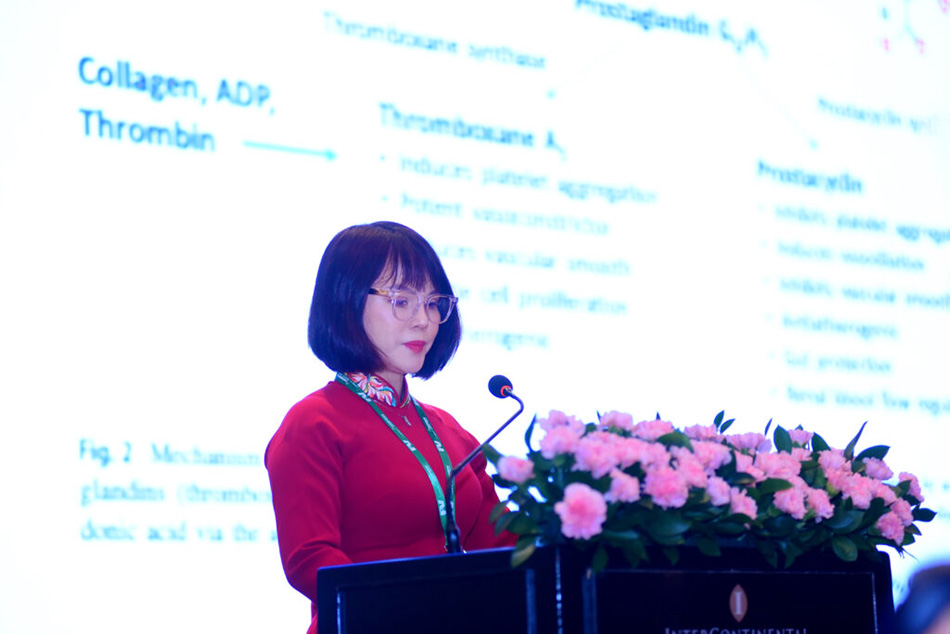
Assoc. Prof. Tran Thi Khanh Tuong, MD, PhD – Head of the Faculty of Medicine, Pham Ngoc Thach University of Medicine
In the report, Assoc. Prof. Nguyen Thi Bich Dao, MD, PhD stated that according to the Vietnamese health insurance statistics, diabetic patients treated with, cardiovascular complications are among the leading complications (accounting for up to 34%). Therefore, early management of cardiovascular complications in diabetic patients is extremely important. Healthcare facilities in Vietnam have begun to adopt a comprehensive approach to patient care, such as using proven beneficial cardiovascular and renal drugs alongside controlling risk factors (blood pressure stabilisation, blood sugar control, lipid management, maintaining appropriate weight). Dr Dao also mentioned some SGLT2 inhibitors like empagliflozin showed benefits for metabolism including reducing HbA1C, weight, stabilising blood pressure, that effectively reduced cardiovascular-renal events.
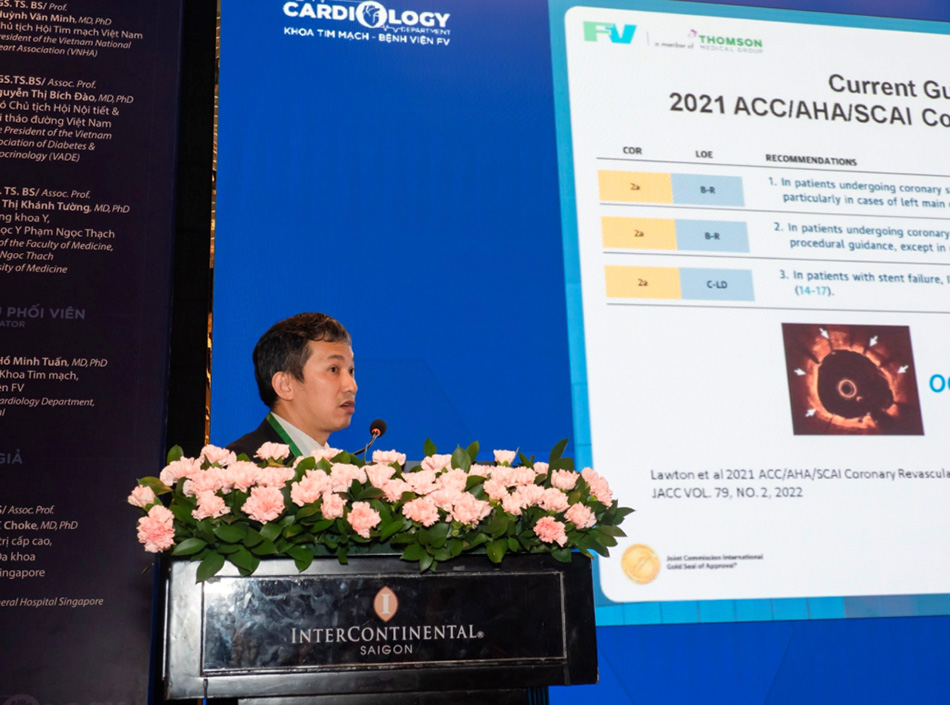
Ho Minh Tuan, MD, PhD – Head of Cardiology Department, FV Hospital
The use of intravascular imaging plays a crucial role in the treatment of cardiovascular diseases. In recent times, FV has successfully applied two techniques: IVUS (intravascular ultrasound) and OCT (optical coherence tomography). These techniques are widely used in major hospitals worldwide to provide excellent support for physicians performing intravascular interventions; they are relatively rare in Vietnam. Ho Minh Tuan, MD, PhD presented the application of these two methods at the conference, based on FV’s treatment experience and the latest global data. This is considered valuable insight for domestic colleagues to implement these techniques in the future, aiming to achieve better treatment outcomes for patients.
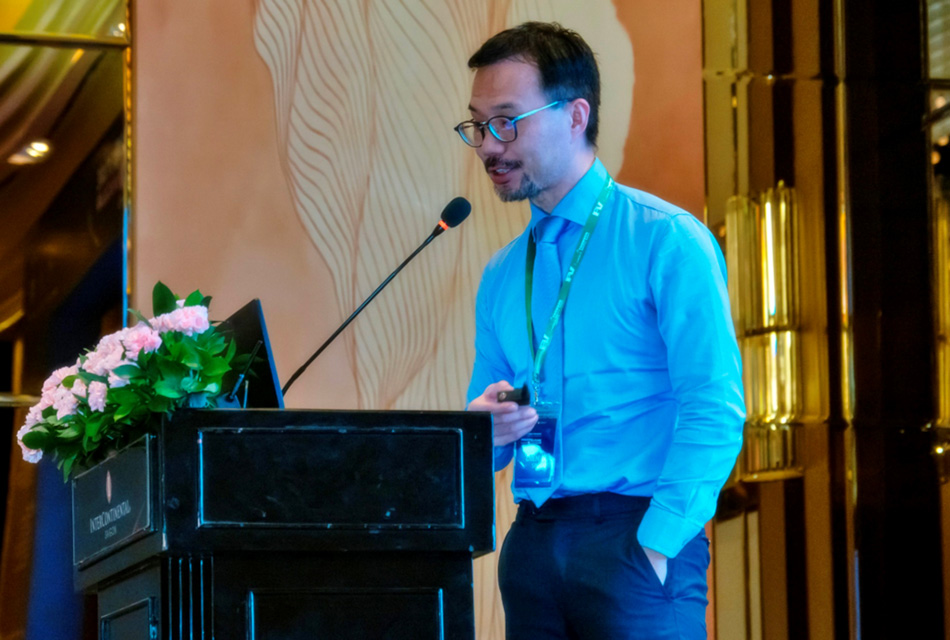
Assoc. Prof. Dr Edward T. C. Choke – Senior Consultant Cardiologist, Sengkang General Hospital Singapore
Peripheral artery disease is a condition characterised by atherosclerosis in the arteries of the limbs (usually the lower limbs), leading to localised ischemia and potential tissue necrosis. The treatment for this condition typically involves medication, stent placement, or atherectomy to remove atherosclerotic plaques. In recent times, there have been advancements in the treatment of this disease.
In his presentation on “Atherectomy options for CTLI”, Assoc. Prof. Dr Edward T. C. Choke introduced a technology for removing atherosclerotic plaques in peripheral arteries using the Auryon System laser. The Auryon System is indicated for use in atherectomy procedures without the need for guidewires, treating stenoses and occlusions in the lower extremities, including in-stent restenosis, and can remove calcified plaques. Clinical outcomes have been highly promising, particularly for patients with severe peripheral artery disease. Ho Minh Tuan, MD, PhD commented, “This is a new technique that has not yet been implemented in Vietnam. Hopefully, following Assoc. Prof. Dr Edward T. C. Choke’s presentation, FV and other hospitals will further explore and adopt this technique for patient treatment.”
In the discussion on Cardiomyopathy and structural heart disease, experts also presented advancements in the diagnosis and treatment of heart diseases and cardiac interventions such as: Diagnosis and treatment of dilated cardiomyophathy (presented by Assoc. Prof. Pham Nguyen Vinh – Vice President of the Vietnam Heart Association (VNHA)); Role of nuclear myocardial perfusion imaging in ischemia and cardiomyopathies (Presented by Dr Nguyen Van Te – Head of Nuclear Medicine, FV Hospital); Percutaneous closure of congenital and acquired ventricular septal defects (presented by Do Nguyen Tin, MD, PhD – Head of Cardio Intervention Centre, Children’s Hospital 1); Current and Future Landscape of Structural Heart Intervention (presented by Ho Minh Tuan, MD, PhD – Head of Cardiology Department, FV Hospital); Trans-Catheter Aortic Valve Replacement (TAVR) (presented by Prof. Asri Bin Said, MD, PhD – Dean of Faculty of Medicine and Health Sciences, University Malaysia Sarawak)
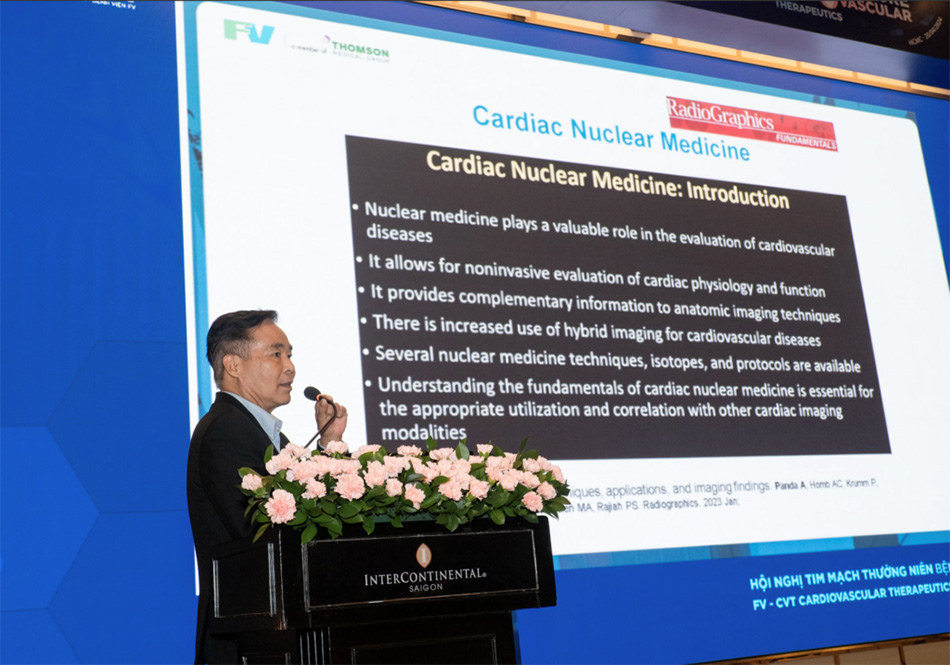
Dr Nguyen Van Te – Head of Nuclear Medicine, FV Hospital
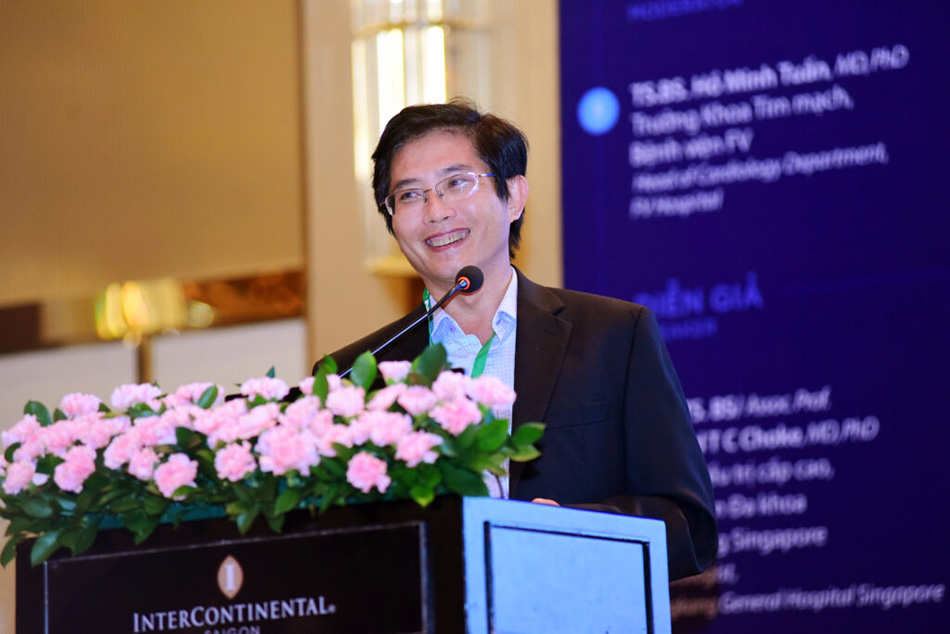
Do Nguyen Tin, MD, PhD – Head of Cardio Intervention Centre, Children’s Hospital 1
Dr Nguyen Van Te – Head of Nuclear Medicine, FV Hospital, presentation was for the application of nuclear imaging in treating heart disease. According to him, using nuclear imaging allows physicians to non-invasively assess the physiology and function of the heart and provide additional reference information for anatomical techniques.
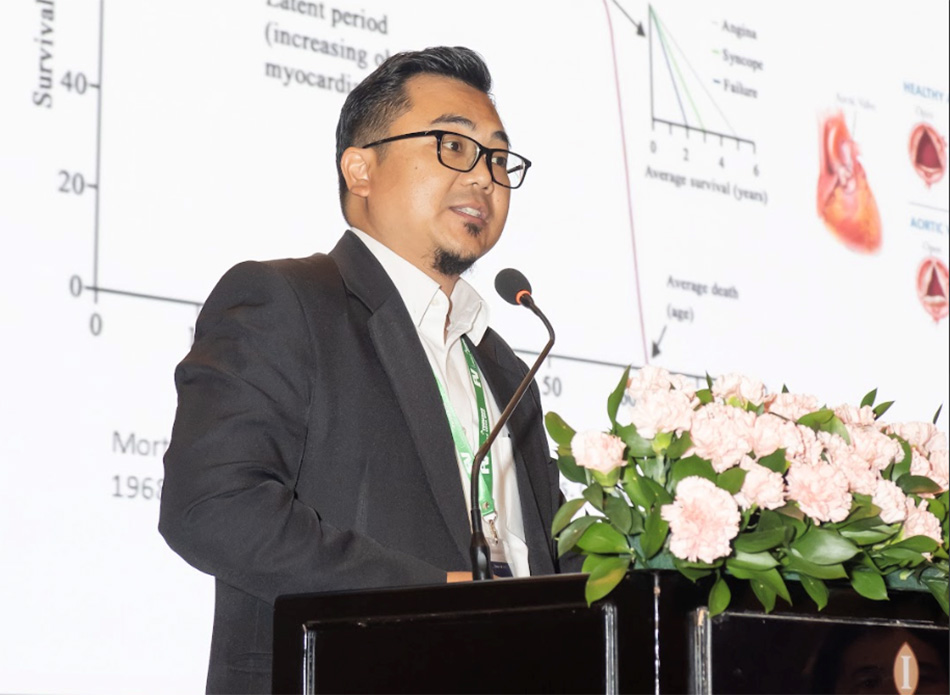
Prof. Asri Bin Said, MD, PhD – Dean of Faculty of Medicine and Health Sciences, University Malaysia Sarawak
The presentation on Transcatheter Aortic Valve Implantation (TAVI) technique by Prof. Asri Bin Said, MD, PhD garnered significant attention. Aortic valve stenosis is a condition where the heart valve cannot fully open, causing obstruction to blood flow from the heart to the body. This condition carries a high risk of mortality and is increasingly prevalent as the population ages, affecting up to 30% of individuals over 70 years old. The traditional method involves open-heart surgery, but for elderly patients, this carries a high risk of failure. The TAVI method, which replaces the heart valve using minimally invasive techniques, has opened up opportunities to save the lives of many more patients with aortic stenosis, especially elderly ones. “TAVI is suitable for cases aged between 65 and 75. The durability of TAVI valves is good for up to 10 years, and it is comparable, if not better, than surgical bioprosthetic valves,” emphasised Prof. Asri Bin Said, MD, PhD.
The TAVI method is now being implemented in many large cardiac treatment centres in Vietnam, including FV Hospital. The oldest patient to undergo this procedure at FV was 83 years old.
“Different from conventional therapeutics symposium, this year’s FV Cardiovascular Therapeutics Symposium focused on practical application,” highlighted Ho Minh Tuan, MD, PhD – Head of Cardiology Department, FV Hospital as moderator of the conference. “The goal of the symposium is to update the latest advancements in the diagnosis and treatment of cardiovascular diseases worldwide, while discussing the feasibility of applying these advancements in Vietnam.”
For more information:
The Cardiology Department at FV Hospital is led by Ho Minh Tuan, MD, PhD, along with a team of highly skilled and experienced physicians. FV Hospital Cardiology Department is equipped with modern diagnostic and treatment facilities, including state-of-the-art Cathlab, which effectively and quickly treat conditions such as coronary artery disease and valve diseases with minimal invasiveness. Most recently, FV has implemented the Transcatheter Aortic Valve Implantation (TAVI) technique to treat many patients with aortic valve stenosis without the need for open-heart surgery.
With a philosophy prioritising patient survival, FV Hospital Cardiology Department implements the “70 Minutes – Golden Time in Cardiovascular Emergency” a protocol to promptly manage cases of acute myocardial infarction who attend FV Hospital.



